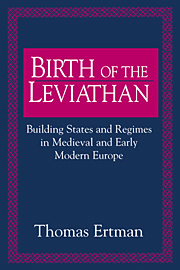Book contents
- Frontmatter
- Contents
- List of Tables
- Acknowledgments
- 1 INTRODUCTION
- 2 THE ORIGINS OF PATRIMONIAL ABSOLUTISM IN LATIN EUROPE
- 3 THE TRIUMPH OF PATRIMONIAL ABSOLUTISM AND THE FAILURE OF REFORM IN LATIN EUROPE, c. 1500–1789
- 4 BUREAUCRATIC CONSTITUTIONALISM IN BRITAIN
- 5 BUREAUCRATIC ABSOLUTISM IN GERMANY
- 6 THE TRIUMPH OF PATRIMONIAL CONSTITUTIONALISM IN HUNGARY AND POLAND AND ITS PREMATURE DEMISE IN SCANDINAVIA
- 7 CONCLUSION
- Bibliography
- Index
5 - BUREAUCRATIC ABSOLUTISM IN GERMANY
Published online by Cambridge University Press: 12 March 2010
- Frontmatter
- Contents
- List of Tables
- Acknowledgments
- 1 INTRODUCTION
- 2 THE ORIGINS OF PATRIMONIAL ABSOLUTISM IN LATIN EUROPE
- 3 THE TRIUMPH OF PATRIMONIAL ABSOLUTISM AND THE FAILURE OF REFORM IN LATIN EUROPE, c. 1500–1789
- 4 BUREAUCRATIC CONSTITUTIONALISM IN BRITAIN
- 5 BUREAUCRATIC ABSOLUTISM IN GERMANY
- 6 THE TRIUMPH OF PATRIMONIAL CONSTITUTIONALISM IN HUNGARY AND POLAND AND ITS PREMATURE DEMISE IN SCANDINAVIA
- 7 CONCLUSION
- Bibliography
- Index
Summary
In the decades prior to the French Revolution, principalities with absolutist political regimes dominated the complex world of states found within the borders of the confederal Holy Roman Empire of the German Nation. Germany's rulers had long since secured the unfettered powers of legislation – also enjoyed by monarchs in France, Iberia, and Italy – which were the sine qua non of absolutism. Unlike their counterparts in Latin Europe, however, German princes also had at their disposal administrative and financial infrastructures that were free of proprietary officeholding, tax farming, and “inside” finance. These infrastructures were instead built around proto-modern bureaucracies largely staffed by full-time, professional, university-trained officials, the so-called Beamten. As such, the states of Germany must be categorized as exemplars of bureaucratic, as opposed to patrimonial, absolutism.
In this chapter, I argue that two factors were responsible for this outcome: a pattern of administrative, top-down local government, itself the legacy of failed dark age statebuilding; and the late onset of sustained geopolitical competition. As in Latin Europe, the fact that the German principalities arose in an area previously occupied by large scale – and ultimately unsuccessful – dark age polities predisposed them towards absolutism. This was so because the fragmented, decentralized political landscape which the collapse of these polities left in their wake led Germany's new generation of state-forming princes to adopt nonparticipatory, centralizing solutions to the problem of local integration. Nobles, churchmen, and burghers in turn responded to the threat posed by intrusive princely officials to their traditional rights by organizing themselves into corporate groups, thereby laying the groundwork for the later appearance of estate-based representative assemblies which were internally divided and defensive, and hence weak.
- Type
- Chapter
- Information
- Birth of the LeviathanBuilding States and Regimes in Medieval and Early Modern Europe, pp. 224 - 263Publisher: Cambridge University PressPrint publication year: 1997



